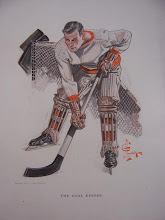As a youth hockey coach, I get to see, up close and personal, the entire spectrum of human behavior, from kids to parents to grandparents. Much of it, frankly, isn't very pretty. And I suppose some think of me and my Old School ways in the same vein. I take the "iron hand, warm heart" approach to coaching. I don't cut the kids much slack. I want them to enjoy sports, but also want them to respect the game. They need to know that games aren't created for their entertainment; the games exist to challenge them, to help them learn and grow. The enjoyment comes from mastering a skill, from learning that extra effort is always repaid in full, and from sharing a unique camaraderie with teammates.
Still, I oftentimes think most parents don't get this approach. My bride once coined the phrase "soccer day care," and I think that probably applies to youth hockey as well. At least town-sponsored programs. Don't get me wrong; I'm not a fan of the over-the-top, win-at-all-costs approach either. But sports, really, are about challenging yourself, getting knocked on your butt and getting back up, and repeating the process until you succeed. It's not about being pampered, or about the nice gear your well-heeled folks can buy for you. In sports, it's about what YOU can do on the ice. No excuses (despite the fact that we live in an area where parents will make every excuse, no matter how preposterous, for their child!).
But every now and then a moment happens to remind me why I do this. It might be an exhausted smile, a rare "thank you," a spark of recognition that what you're preaching is getting through. Last weekend our Squirt 2 team had a game (at the ungodly hour of 6 a.m., at a rink an hour away) against a squad from Haverhill. Unfortunately for Haverhill, their goalie didn't show, which meant some poor kid without the proper equipment had to stand between the pipes. By late in the second period, with our squad winning 5-0, my assistant coach and I implemented a "three-pass minimum" in the offensive zone (like I said, the other team didn't have a goaltender, and we had no intention of running up the score). We re-emphasized that rule between periods. It was, we said, not only the right thing to do from a sportsmanship perspective, but our players needed work on their passing.
In the third period, one of my defensemen, a burly, likable kid (we'll call him "Bobby," in the interests of anonymity), intercepted a clearing attempt and took a shot from the point without the requisite three passes. My assistant and I immediately agreed to take him off the ice. This is where it gets interesting. I asked Bobby if he understood why I pulled him, and he sheepishly admitted he knew he should have passed. I emphasized that there are times when you have to resist doing what you want to do, and instead do what's right (in this case, pass, so we could be good sportsmen). The boy nodded. A moment later, he mumbled something behind me. When I asked him to repeat it, he said: "I'm sorry, Coach." It was incredibly sincere.
The next time I looked at him, he had tears running down his cheeks. I was really moved ... this young man really cares about the game, and really cares about doing the right thing. I was proud of him. "It's OK, Bobby," I told him. "We're good, right?" He quietly said "yes," and I knew we were.
Best,
-B


